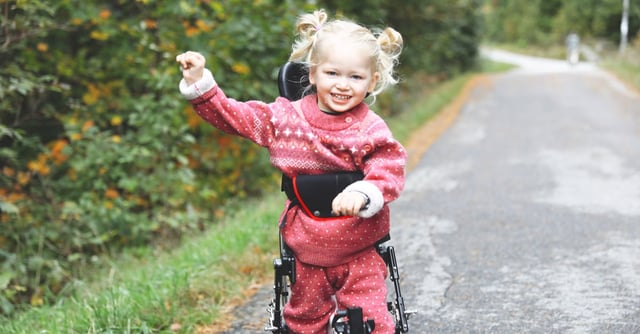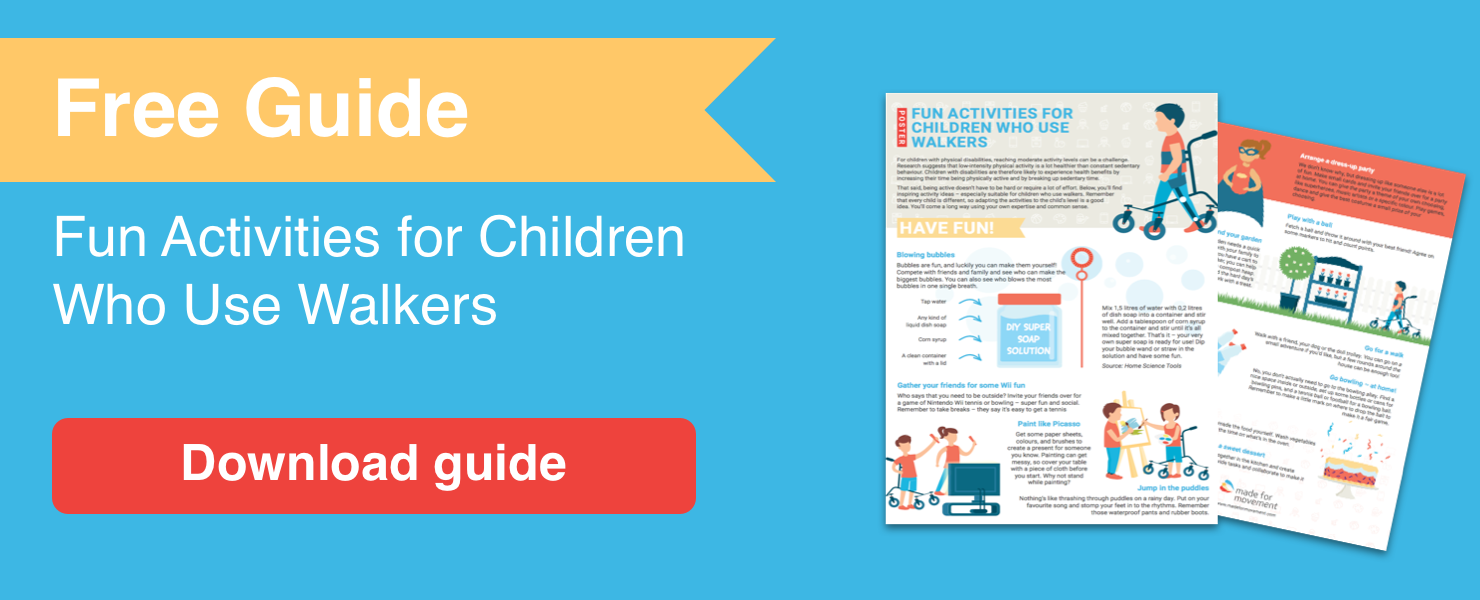
Dec 14, 2020All for Ella - and an independent life despite of her CP

Back to Blog Overview
Ella is a cheerful, expressive and social 3 ½-year-old girl. She loves exploring the world in her
NF-Walker. Despite a CP diagnosis, the gait trainer gives her freedom of movement, not least the opportunity to decide for herself where she wants to go. "NF-Walker is clearly the assistive device that gives Ella the greatest opportunity for independence," says Malin, Ella’s mother.
Ella was born at term, but the birth became very complicated, and unfortunately what you don’t want to happen, happened! Ella did not receive enough oxygen supply during the delivery, and already a few days after birth, an MRI scan showed that there was damage to the basal ganglia. Basal ganglia is the area of the brain that regulates the movement activity in the body, and the parents understood that this could be serious. The first 3 weeks at the neonatal intensive care unit was a period of great uncertainty for the parents. What were the consequences of the damage to the brain, and what would it mean for Ella's future?
After a few weeks in the intensive care unit the sedation was reduced, and Ella became more and more awake. She had clear and bright eyes, looked at the world with eyes wide open and was very present. Although the first period of Ella's life had been chaotic and many emotions were at play, her parents were relieved that Ella seemed to be doing well. Up until the 2 month check up, her social development in particular looked promising. She smiled, laughed and was an attentive child. Around the age of 4 months it was clear that her motor development deviated from what was expected, and when she was 9 months old, she was diagnosed with cerebral palsy.
Social inclusion and participation most important
"When Ella was diagnosed with CP, we knew little about what it meant," says Malin. The parents did as most do, searched on Google. They didn’t think it was necessarily scary to read about CP, as there are so incredibly varying degrees of this diagnosis. "Many people with CP live an almost normal life," Malin says. The diagnosis itself was therefore not the worst, but more the uncertainty about what the future will be like for their daughter.
The parents say that their worries are mostly about "will she be included in the play with the other children?" and "will the other children wait for her?". Their worries also circle around the adults taking care of Ella, whom she is so dependent on. Do they support her when she is playing with the other children? Do they arrange for her to have the opportunity to be involved with others and make sure she does not become an observer or is excluded?
„My biggest fear is that she will be passive and just kept. We want her to participate in everything, and we will do everything we can for her to achieve that.“Fortunately, Ella has developed a good cognitive function with age-appropriate social skills. She loves reading books and communicating using Tobii, an eye-tracking communication device. "With positivism and a great deal of patience, I think Ella is well equipped to face the future," says her dad Kim.
The family also has many good friends around them with children of the same age in addition to siblings and cousins. It means a lot and gives you security in your life. There are children Ella grows up with, and they will always be there for her and for the family.
Assisted devices promoting function
Ella has dyskinetic CP and a functional level equivalent to GMFCS IV. This means that she does not have an independent sitting, standing and walking function. Despite this, she has gradually learned to move independently in the NF-Walker.
She got NF-Walker just before Christmas 2018, when she was barely 2 years old, and this gait trainer is one of Ella's favorites.
She clearly states that she wants to get up and go in NF-Walker with the help of her Tobii.
Read more: What is GMFCS and why is it used?
They tried different gait trainers before choosing the NF-Walker. It turned out to be the aid that gave her the best support so she mastered walking. The expectation of NF-Walker was first and foremost that it would give Ella the opportunity for independent mobility. And Ella has achieved that! She is now finally exploring the world on her own, touching things, opening cupboards, tossing flowers and having the opportunity to be a little naughty without adult interference, and it is clear that she loves it!
She has an NF-Walker in the kindergarten that she uses several times a week both indoors and outdoors. In addition, she has one at home that she uses in the afternoons and weekends. The parents focus on naturally incorporating NF-Walker into everyday activities and thus compensating for the disability. They take the NF-Walker to the store, let Ella roll the cart and choose groceries. They spent Halloween at their cabin, and Ella went on a ghost hunt in the NF-Walker with the other children. Outside, she often takes her doll in the dolls carriage pram on walks.
Read more: What product suits my child?
The parents want Ella to have aids that help to give her opportunities for activity and participation on an equal footing with other children. Therefore, her adapted bike came along with them to the Zoo so Ella herself could decide what path she wanted to take and which animals she wanted to visit.
Her adapted bike is one of the newest aids Ellas has received, and her parents were very surprised to see how quickly she understood how to push her feet against the paddles to get speed forward and that she has gained enough strength in her legs to master it. The fact that she can ride a bike and walk in the NF-Walker affects the way other children look at Ella. By reaching the same eye level, she becomes more equal and more easily accepted. She becomes part of the gang and participates, which is incredibly important for Ella's social development. When she walks in the NF-Walker, children can say: "I didn’t know that Ella could walk!".
What is training?
"Many people around us say: - you are so good at carrying out training with Ella in both her standing device and in the NF-Walker" Malin says, "but for us this is not training". The parents elaborate that they see assistive devices as an opportunity to support Ella's function to master daily activities. For example, in the standing device she is so well supported that she achieves better function in the arms, and in the NF-Walker she gets the opportunity for independent mobility.
When a new assistive device is introduced to Ella, the parents encourage intensive use in a habituation phase and practice a lot to ensure that Ella masters it. "It becomes a kind of training, but as soon as she masters it, we see the aid as part of everyday life, and that it contributes to Ella’s independence," say Malin and Kim.
Ella is treated by the physiotherapist three times a week in addition to hydrotherapy once a week. The focus in the training with the physiotherapist has been to improve especially head and upper body control, and Ella has had a nice development. Previously, Ella managed to hold her head up for about 15 minutes when she was in the NF-Walker, but now she can do it much longer.
The importance of personal assistant
Ella has personal assistance on a daily basis and the parents tell with great enthusiasm about the importance of having been granted this service by the municipality.
The fact that she has personal assistance from an early age means that she grows up having people around her who are there for her so that she can live an independent life where she can make her own choices. We are convinced that it will be of great importance for her youth and adult life as she develops good knowledge from an early age about how the assistants can give her practical assistance in everyday activities. It gives Ella the freedom to decide how she wants to live her life.
What is personal assistance (statutory benefit in Norway)?
Personal assistance is an important contribution to equality, gender equality and community participation for people with disabilities and a great need for assistance. It will give people the opportunity to take part in work-life, education and live an active and independent life.
As part of its responsibility under the Health and Care Services Act, the municipality has a duty to offer personal assistance.
Ella having personal assistance means that both parents can work full-time, and that Ella still receives the support and help she needs to live her life to the full.
Her dad Kim tells us that Ella has developed a close and good relationship with all her assistants, and that she gives them a great smile when they come through the door. In the afternoon, they often help Ella into the NF-Walker for a walk or take a trip in the WizzyBug, a powered wheelchair, while the parents make dinner. It’s of great significance for the family. "If we hadn’t had personal assistance, many of the activities the assistants carry out would probably not have been done, since Malin and I have too few hands," says Kim.
Personal assistance for children was not so common in the municipality where they live when the family applied, but they were granted it fairly quickly. "We are incredibly grateful that the municipality made it possible for Ella to get personal assistance.
It means everything to us that we can help to facilitate that Ella can live as independent and good a life as possible despite the fact that she has a disability ", Kim and Malin say.
Do you want to know more about CP?
Read our resource page with answers to most of your questions.

Rikke Damkjær Moen brings many years of experience as clinical physiotherapist to the Made for Movement team. Her mission is to ensure that everybody, regardless of mobility problems, should be able to experience the joy and health benefits of physical activity. As our Medical Manager, Rikke is passionate about sharing knowledge so that individuals with special needs, families, and clinicians can discover the possibilities and solutions provided by Made for Movement.


